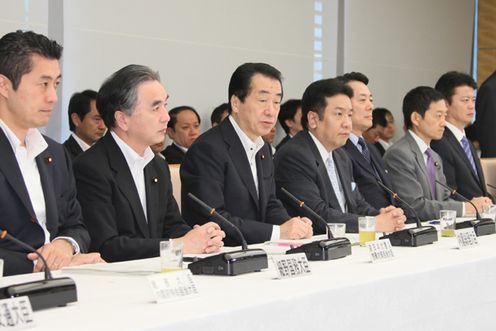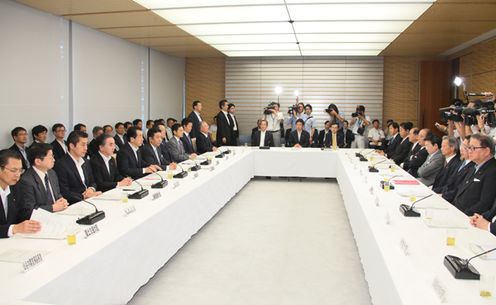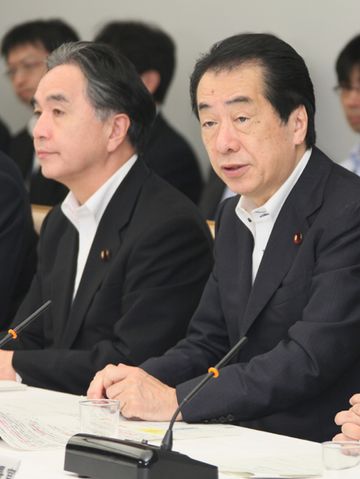Joint Meeting of the Headquarters for the Reconstruction from the Great East Japan Earthquake, the Emergency Disaster Response Headquarters, and the Nuclear Emergency Response Headquarters
Friday, August 26, 2011

Photograph of the Prime Minister delivering an address at the joint meeting of the three headquarters 1

Photograph of the Prime Minister delivering an address at the joint meeting of the three headquarters 2

Photograph of the Prime Minister delivering an address at the joint meeting of the three headquarters 3
In the morning, Prime Minister Naoto Kan held a joint meeting of the Headquarters for the Reconstruction from the Great East Japan Earthquake (6th), the Emergency Disaster Response Headquarters (18th), and the Nuclear Emergency Response Headquarters (19th) at the Prime Minister's Office.
At the meeting, on the part of the Headquarters for the Reconstruction from the Great East Japan Earthquake and the Emergency Disaster Response Headquarters there was a report on the current state of restoration and work to address major issues, and on the part of the Nuclear Emergency Response Headquarters a decision was made on the Basic Policy on Urgent Implementation of Decontamination. Furthermore, on the part of the Headquarters for the Reconstruction from the Great East Japan Earthquake there was a report on setting up a venue for discussion with Fukushima Prefecture.
Based on the discussion, the Prime Minister said, "For 169 days since the March 11 disaster up until today, each of you have exerted the utmost efforts in your respective responsibilities for restoration and reconstruction on the one hand and the conclusion of the nuclear incident on the other hand. I want to thank you again for all your efforts. Thanks to your efforts, many people were rescued and provided with assistance during the early stages of the disaster and now we are seeing steady progress with regard to the construction of temporary housing, removal of rubble, livelihood assistance for those who survived the disaster, and other endeavors.
Meanwhile, concerning the nuclear incident, we were able to complete Step 1 of the Roadmap on July 19 and realize the stable cooling of the reactors using a circulating injection cooling system. Nevertheless, there are still major issues yet to be resolved. In particular, decontamination efforts to remove radioactive materials will be the major issue for the regions affected by the nuclear disaster going forward.
In this context, a decision was made on the Basic Policy on Urgent Implementation of Decontamination. This is the important first step for allowing the residents to return to their homes. Continued efforts are needed to comprehensively address various forms of contamination, going beyond the divisions between ministries and agencies. Also, through discussions with Fukushima Prefecture, I would like to see the voice of the local communities thoroughly respected and reflected as much as possible in the future plans.
The Basic Policy on Urgent Implementation of Decontamination stipulates a broad aim that the national government will commit itself to reducing the level of contamination to below 20mSv/year in the regions where contamination exceeds that limit and, at the same time, thoroughly assist each local government and community where the contamination level is below 20mSv/year to bring it down to a level as close as possible to 1mSv/year, based on which it sets a policy to proceed with specific measures on a individual basis. I believe it will require an enormous amount of work, and while working with the local governments I would like to harness all of the power available to bring these regions back to the state where people can feel safe to raise children.
Concerning the process of reconstruction, we have entered the stage for full-fledged implementation of reconstruction projects, having local municipalities - the main players in reconstruction - compile their own reconstruction plans and consolidating them into the national reconstruction roadmap.
Today will probably be the last opportunity for these three important headquarters to meet under the current Cabinet. In any case, we cannot spare even a second for doing what must be done. I ask you to continue doing your utmost until the very last moment of this Cabinet, and to make sure that these issues are addressed by the next Cabinet."


